Harry Potter and the Order of the Phoenix
 for sequences of fantasy violence and frightening images.
for sequences of fantasy violence and frightening images.
Reviewed by: Robbye Fielden
CONTRIBUTOR
| Moral Rating: | Very Offensive |
| Moviemaking Quality: |
|
| Primary Audience: | Teens Young-Adults |
| Genre: | Action Adventure Supernatural Fantasy Romance Teen Adaptation Sequel |
| Length: | 2 hr. 18 min. |
| Year of Release: | 2007 |
| USA Release: |
July 11, 2007 (wide—conventional theaters and IMAX) |
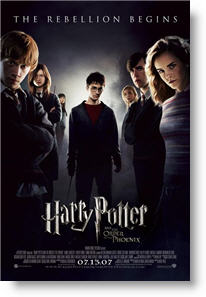
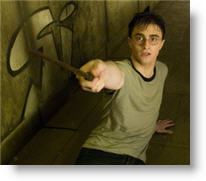
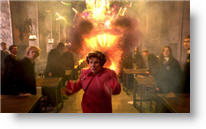
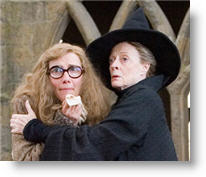
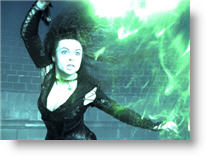
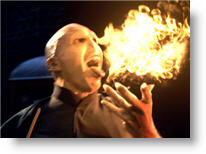
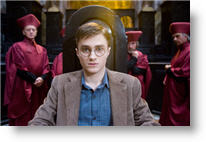
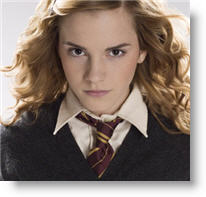
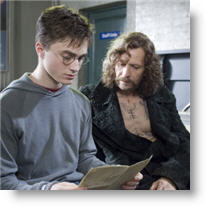
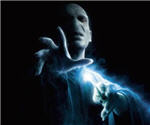
Eternal life—What does the Bible say about it? Answer
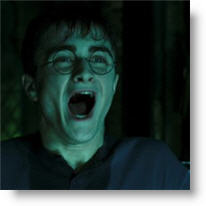
Are you good enough to get to Heaven? Answer
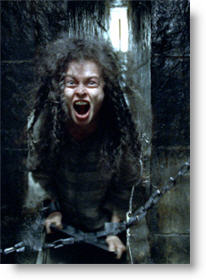
What is the Occult? Answer
THE OCCULT—What does the Bible say about it? Answer
FALSE PROPHETS—Nostradamus, did he predict the bombing of the Twin Towers in New York? Answer
Is there valid prophetic evidence that the Bible is God’s Word? Answer
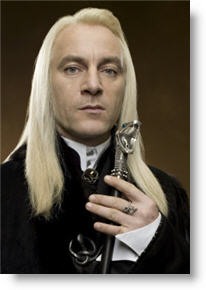
| Featuring |
|---|
|
Daniel Radcliffe (Harry Potter) Emma Watson (Hermione Granger) Rupert Grint (Ron Weasley) Ralph Fiennes (Lord Voldemort) John Cleese (Nearly Headless Nick) Michael Gambon Imelda Staunton (Dolores Umbridge) Robbie Coltrane (Rubeus Hagrid) Tom Felton (Draco Malfoy) David Bradley (Argus Filch) Alfie Enoch Pam Ferris (Aunt Marge) |
| Director |
| David Yates (feature debut) |
| Producer |
|
David Barron David Heyman See all » |
| Distributor |
“The rebellion begins”
The fifth installment of the Harry Potter films finds the wizarding world divided over the tragic events surrounding the close of the previous school year. After Harry (Daniel Radcliffe) returned from the portkey during the Tri-Wizard Tournament claiming that the Dark Lord Voldemort (Ralph Fiennes) had returned to bodily form, the Ministry of Magic began to promote the idea that Harry and anyone who believed his story were liars. Meanwhile, a small contingent of witches and wizards revived an alliance that had opposed Lord Voldemort fourteen years before: The Order of the Phoenix.
In the midst of all of this, Harry, Ron (Rupert Grint), and Hermione (Emma Watson) return to Hogwarts only to find that the conflict is intergenerational. Already grief-stricken from witnessing the death of classmate Cedric Diggory (Robert Pattinson) and the return of Lord Voldemort, Harry is met with tremendous suspicion by the other students at Hogwarts. He finds himself isolated both by the lack of support from his peers as well as the grief he’s struggling to work through.
To complicate matters, the Defense Against the Dark Arts teaching position has been filled by Dolores Umbridge (Imelda Staunton) whose sickeningly sweet appearance and public behavior masks a harsh disciplinarian with a vendetta against Albus Dumbledore, Hogwarts, and all those who maintain the belief that Lord Voldemort has returned. Since Professor Umbridge will only teach a ministry-approved curriculum, which does not include the use of magic in defense, a group of students turn to Harry, the only student with any real experience, to teach them to defend themselves. The group calls themselves “Dumbledore’s Army,” and begins to meet in secret in spite of the many decrees put in place by Umbridge. Together they prepare for whatever battle their future may hold.
The return of Lord Voldemort at the end of “The Goblet of Fire” marks a turn in the mood of the overall storyline. While there have been many dangerous moments for Harry in previous years, the wizarding world is now facing a real and living enemy so evil that most wizards refuse to speak his name aloud. As a result, the fifth book and movie are darker than those that have preceded it. A battle of enormous proportions between good and evil has begun. The gravity of the situation is a tremendous weight for The Order of the Phoenix to carry, and the stress is evident in their interactions and on their faces.
As with the previous Harry Potter books and movies, it is increasingly difficult to capture the level of detail in J.K. Rowling’s writing in a 138-minute film. While an avid Harry Potter reader may find that the movie manages to capture the overall events of the book, a viewer with no knowledge of the book is likely to be a bit lost in the plot.
Additionally, detailed-oriented readers may find themselves frustrated with minor changes to the plot as it appears on-screen. Sadly, the limited time of the movie also allowed for little character and relationship development, so viewers must rely on very little information or their pre-existing knowledge of the story. Fans will likely find, regardless, that the directors have accurately captured the newcomers to the story, both human and non-human, from our imaginations and placed them before our eyes. Harry Potter fans will certainly consider this a must-see. As with most series, knowledge of the story and previous movies is a prerequisite for other viewers.
The Harry Potter books and movies have been controversial within the Christian community since they first became so widely popular. The primary objections to this series are without a doubt still present. (The previous four Harry Potter movie reviews cover these objections in great detail.) Harry and his friends are still wizards and witches, and they still have a tendency to knowingly defy the rules in the name of the greater good, often without direct consequences. If it is this sort of material that offends, then know that it is definitively present in typical Harry Potter fashion. There are still bad witches and wizards who will perform the “unforgivable” curses, there are more battles with magic, and Fred and George Weasley (James and Oliver Phelps) are as unruly as usual. Additionally, Harry receives his first kiss (which is rather extended for a first kiss), and the introduction of Dolores Umbridge brings up new issues of being under the authority of someone who is quite cruel in her punishments.
On the other hand, this movie creates multiple opportunities for later discussions of some deep moral issues. For instance, in one discussion with Harry, Luna Lovegood (Evanna Lynch) reminds Harry that he’s not alone in his struggles, but that Lord Voldemort would like Harry to believe that he is isolated because he’s not much of a threat alone. For a Christian, the greatest enemy, Satan, often works in the same way. By isolating a believer and convincing him that he is alone in the battle, Satan leaves him weak and defenseless. Thankfully, we can be confident as believers that Christ never leaves nor forsakes us (Deuteronomy 31:6), and we have the fellowship of other believers to encourage us as we battle against the Evil One.
Harry’s godfather, Sirius Black (Gary Oldman), also raises a very theological issue during a conversation in which Harry worries that he’s becoming evil. Sirius’s advice to Harry is to recognize that each person has both good and evil in him, but what matters is which he chooses to act on. While the characters of Harry and Sirius apparently do not know God, this capacity for good or evil that Sirius refers to is a Biblical concept. Though a Christian is forgiven of his sins, he still has the freedom to choose to sin again in the future. Fortunately, the Bible tells us that “If we have been united with him like this in his death, we will certainly also be united with him in his resurrection. For we know that our old self was crucified with him so that the body of sin might be done away with, that we should no longer be slaves to sin—because anyone who has died has been freed from sin” (Romans 6:5-7; see also Ephesians 4:22-24). We can rest assured that we are not slaves to sin, and therefore we are free to choose to act in a godly way in all that we do.
[SPOILER WARNING FOR THIS PARAGRAPH] One topic with spiritual implications that is especially apparent in this film is that of death. Throughout the movie many of the characters, Harry most specifically, are struggling with the murder of Cedric Diggory. Then, merely a year later, Harry again witnesses another murder, only this time it hits closer to home. Harry loses the only family he’s ever known when Sirius is killed by Bellatrix Lestrange (Helena Bonham Carter). This murder takes place within the Ministry of Magic. The room contains an archway which appears empty and quiet to Hermione, who has not experienced a death in her life, yet Harry can hear voices coming from the archway. When Sirius is murdered, he steps through this archway and disappears. While it’s not perfectly clear what the archway represents, there is an implication that an afterlife exists for those in the wizarding world.
This portion of the story provides excellent fodder for a discussion of the certainty Christians have regarding spending eternity in Heaven after death. We know that a place has been prepared for us in Heaven (John 14:1-3), and that by believing in Christ we “will not perish, but have eternal life” (John 3:16).
Undoubtedly there are many more spiritual issues within the plot of this movie, including even an overarching discussion of the battle between good and evil. Despite the usual objections that accompany fantasy involving witches and wizards, there was surprisingly little crude language in the movie. The PG-13 rating is well deserved, however, as there are numerous scary images and an intense wizard battle. Please be aware of this for young and sensitive children; this is not a family film.
The bottom-line is that fans of the Harry Potter books and movies will likely enjoy this latest installment. Those who have not seen the first four movies or have not read the books will find little enjoyment in this film. Additionally, those who previously avoided and boycotted Harry Potter for the associations with witchcraft and the occult should continue to avoid the movie because those premises have not changed. If you choose to see this movie with children, it will be important to take the opportunity to discuss the spiritual matters afterward. There is certainly ample material to create a “teachable moment.”
Violence: Moderate / Profanity: Minor / Sex/Nudity: None
See list of Relevant Issues—questions-and-answers.


I would caution parents that this film is not appropriate for very small children, for the same reasons the book isn’t—but reading about something is not the same as watching it, and scary scenes in the novel are even scarier on film, particularly an attack upon a character through a nightmare. That being said, the last half hour includes one of the most tremendously impressive fight sequences I have ever seen! The CGI is beyond astounding.
From a Christian perspective—and with no desire to berate the creation of these fairy tales—none of the magic is particularly offensive; the most alarming scene has Voldemort taking possession of Harry for a short time in an attempt to kill him; but Harry is able to force him out through the use of Love, in an indirect spiritual contrast with the overall message of the series: that True, Honest, and Pure Love (Christ’s sacrifice) can always defeat Darkness (Lucifer).
Better than Average / 5
Good / 5
Better than Average / 4½
If you are looking for a good totally Christian movie, don’t go see Harry Potter number 5. It isn’t a Christian movie, but it isn’t trying to be. It’s fantasy movie that tells an amazing story. I was raised in a Christian household and am a Christian and I wasn’t offended or up set over the material. I think I’m more upset about people remaking the cult classic, Halloween. But that’s another story. Overall, Harry Potter and the Order of the Phoenix is an excellent movie for teenagers and some preteens, but not for young children who may not understand the story.
Excellent! / 5
Average / 5
For example, if you are going to do anything particularly significant you are going to be lonely at some point; are you prepared to lose your popularity for what you believe is right. Also, are you prepared to put those at risk who trust you. Found a delightful parallel to the attitude of many churches to spiritual warfare. The authorities clamp down on real defense training at Hogwarts as irrelevant and too dangerous. This is in fact just a bid to be in control and keep the kids education nice and theoretical—able to pass exams—not fight a “fictitious enemy.”
And the ultimate message is that we can choose to do the right thing regardless off our past baggage. Not bad for an afternoons entertainment. Not as many twists and turns as other movies—a bit more “grown up” you might say. A well rounded satisfying story—I think this may turn out to be one of my favorites of the series.
Good / 4
I do admit I was surprised at the amount of moral lessons in this movie. You expect a movie like Spiderman to have a lot of them because he is an all American fictional hero. One moral lesson illustrated, which I liked a lot, was that evil people will use the bureaucracies to push their wicked agendas. Parents need to use Godly discretion in deciding if their children are too young or not to see the film. Also, the main children that could get carried away with the fantastical elements of the book/movie, and thus be led farther from Christ, are those who are not being trained, supervised, or given a rich and nurturing biblical culture to embrace by their parents. Those same kids will get carried away with the make-believe worlds of comic heroes, and-or the fantasia of “The Lion, Witch and the Wardrobe,” “The Lord of the Rings,” or Harry Potter. If children are not involved in fun and engaging activities that touch their minds, hearts and imaginations at home, church and their Christian schools, then they will look to the world to provide things that do. And who can we blame for that?
Better than Average / 3½
Better than Average / 4½
Just to get it out of the way, I’m pro-Harry and I love the series (though I’ve gotten as far as book #5). I definitely believe that the books in no way support Satanism, nor does the magic in HP have anything to do with witchcraft as we know it in our world, as the Bible warns us against. And, of course, I don’t look down on anybody who doesn’t agree with me—to each their own belief/opinion.
While in vacation in Tennessee, I borrowed the books from an uncle of mine. And I ate them all up—the very first time I ever did so! And right after I finished the Order of the Phoenix book, I went thrift shopping and found the movie version. (Now, before seeing it, I only saw the 1st HP movie and didn’t see any others, but I figured I shouldn’t turn down the opportunity to see Order of the Phoenix as I’d just read the novel.)See all »
Moral rating: Good / Moviemaking quality: 5
Average / 4
Better than Average / 4½
Just to get it out of the way, I’m pro-Harry and I love the series (though I’ve gotten as far as book #5). I definitely believe that the books in no way support Satanism, nor does the magic in HP have anything to do with witchcraft as we know it in our world, as the Bible warns us against. And, of course, I don’t look down on anybody who doesn’t agree with me—to each their own belief/opinion.
While in vacation in Tennessee, I borrowed the books from an uncle of mine. And I ate them all up—the very first time I ever did so! And right after I finished the Order of the Phoenix book, I went thrift shopping and found the movie version. (Now, before seeing it, I only saw the 1st HP movie and didn’t see any others, but I figured I shouldn’t turn down the opportunity to see Order of the Phoenix as I’d just read the novel.)See all »
Moral rating: Good / Moviemaking quality: 5
In one scene, Harry and the students learn to conjure up their Patronus, a quasi-independent entity, usually appearing as an animal, that acts to protect them. The Patronus first appears in “Harry Potter and the Prisoner of Azkaban”. The description of this in the book is reminiscent of what is called in the occult a “thought-form,” sometimes considered a familiar spirit, especially if it takes the form of an animal. I learned about this in psychic classes I took in the 80s. A thought-form is a “quasi-independent constellation of psychic elements,” conjured up to “act in accordance” with the will of one who conjures it, and which is “reabsorbed” into the person’s consciousness when it has done its job (Janet and Stewart Farrar, A Witches’ Bible [Custer, WA: Phoenix Publishing, 1996], 93, 240-41, 320-21).
The thought-form is considered to be an astral entity, a spirit conjured on the astral plane by someone on the Earth plane (Gonzalez-Wippler, The Complete Book of Spells, Ceremonies and Magic. 2d ed. [St. Paul: Llewellyn, 1996],105). The astral plane, according to some occult and New Age teachings, which I learned about when involved in the occult myself, is a dimension beyond the material plane which can be contacted in dreams, through rituals, or visited by the astral self. The astral plane is the “working ground” of the magician (someone who uses real magick—not stage magic, which is just tricks and illusions).
Using spells and magick to fight “dark magick” is called “white magick.” This shows that the books are not really about good vs. evil, but more about good magick against dark magick. However, there is no such delineation between white and dark magick in God’s view, according to his word. God forbids all spellcasting and magick, and shows that his power is greater (the Bible may use varied terms such as “sorcery,” “soothsaying,” “enchantment,” “witchcraft,” “divination,” and “incantations”). See Ex. 7:11, 22, 8:7, 18-19; Lev. 19:26; Deut. 18:10; 2 Kings 17:17, 21:6; Is. 47:9, 12; Jer. 27:9, Acts 8:9-11, 18-21, 13:6-12, 19:19; Rev. 9:20-21, 18:23, 21:8, 22:15.
In the book this movie is based on, Dumbledore explains that when Harry’s mother died for him, her death acted as a protective charm that saved him. By placing Harry in his mother’s sister’s home, Harry was protected further by his mother’s blood (flowing in the veins of her sister, Harry’s aunt), and thus his safety was ensured. Doing this “sealed the charm” (page 835). Far from being a picture of how Christ saves us through his sacrifice on the cross, as some have claimed (once again, reaching for Christian symbolism), this instead vividly presents an occult view of what Harry’s mother did. Her death was, or became, a charm, an act of magic. This love theme is not based on what the book presents and is carried too far to explain away the occult practices—practices used by real people such as Divination, charms, and casting spells.
Since I used to practice divination as an astrologer, I know well its dangers. It opens one to spirit contact; in fact, divination (includes astrology, palm reading, tarot cards, and may other similar things) will tend to lead to spirit contact, whether one wants it or not. Casting spells does this as well, even more so.
I think this movie, as do all the Harry Potter movies, can make the very practice of the occult or the possession of paranormal powers enticing. This is very dangerous bait.
Moral rating: Very Offensive / Moviemaking quality: 3½
Extremely Offensive / 4
Average / 2
Good / 4½
Very Offensive / 4
Excellent! / 5
Offensive / 5
Excellent! / 5
Excellent! / 5
Better than Average / 5
I fail to understand how Harry Potter is an evil work while The Lord of the Rings and The Chronicles of Narnia both contain magic and yet are praised by Christians the world over. It seems to me as if the vast majority of Christians simply want something to fight against.
As for the movie itself, excellent. The movie making of this series has always been top notch. Warner Bros. spared no expense in bringing The Order of the Phoenix to the big screen. Duels are larger than life, Voldemort looks just as evil as ever, and the magic looks fantastic. Plus, we have the equivalent of the Yoda lightsaber battle from “Star Wars: Attack of the Clones.”
Plot wise, if you haven’t read the books then the movie might appear confusing. The movie makers had to condense the largest book so far (the 7th is rumored to be bigger) down to two and a half hours or less. I think they did as well as they could.
Overall, I whole-heartedly recommend this movie. If your child can’t separate reality from fiction then don’t take him/her. Otherwise enjoy this piece of FICTION.
Very Offensive / 5
Good / 5
Using visions of a tortured Sirius Black, Harry’s godfather, Voldemort lures Harry to the Hall of Prophecies at the Ministry of Magic because He desires to possess a prophecy only Harry can take out of its holding place. Harry brings his closest friends with him, Hermione, Ron, Neville, and new to the series Luna Lovegood. Voldemort and Dumbledore have an ultimate dual during this scene and (spoiler alert) Bellatrix Lestrange kills Sirius. Sirius falls back into an archway in the middle of the room and disappears from site. Harry still hears voices coming from the archway, however. This climactic scene is the only real plot point in the entire film. The rest of the film leads up to this moment where Harry must choose good over evil in order to prevent Voldemort from taking over him.
The film has less of a plot to it, and very little mystery. The book builds more on Harry’s visions that lead him to go to the Hall of Prophecies, but the movie, with very little time, must choose what is most important to the film. I am happy with what writers and directors chose to keep. In this film you see very little of Harry’s friends and professors and lots of Harry. You will find that the development of Harry’s character in this film will become very important in the sixth movie. While the fifth installment lacks mystery, it lays the foundation for future installments. Harry deals with his dark side and must choose whether to give in or stand up to evil.See all »
Good / 4½
Even though the characters aren’t Christian, doesn’t mean that they are all worshipping Satan. Because throughout the series there isn’t any devil worshipping. And “The Lord of the Rings,” a series FULL of violence, and with some magic, still a great movie. Written by a Christian author. Hmm, would I want a child of mine watching a movie with all that violence? No. Would I let my young child under 13 watch Harry potter? No, because of the rating. It’s not a young children’s series. Duh. I’m not stupid. But it’s not evil. I was talking with my Youth Leader about this problem. She doesn’t see why they are portrayed as evil either. For one, as she pointed out, Harry and his fellow witches and wizards, are born with this “gift.” They don’t suddenly decide to be a witch or wizard. From birth they are this way. They don’t practice rituals or anything of the sort. And to point out the obvious. it is FANTASYY. FICTION, not real. JK Rowling never said it’s based of true events. I rated this average, because it isn’t for younger children
Average / 5
The new casting for this movie was good, although Umbridge didn’t seem quite horrible enough. The highlight of the movie is definitely when Fred and George leave Hogwarts in their spectacular way.
Many people say that Harry Potter is extremely wicked because the Bible condemns magic. I have heard from a pastor that the Hebrew word for magic means, “gaining powers through being possessed by demonic spirits.” At no time in the books, or movie, does J. K Rowling state how the characters gained their magical powers; even though they are around ghosts and spirits, they are not possessed by them in any way.
…Harry Potter is a work of Fiction; it is a story that had been imagined by its author; it is a story that is unreal. Harry Potter also has many good morals: The fight between Good and Evil, Good triumphing over Evil, Love is the key, etc.
I myself am a young Fantasy author who has a book at the printers now. I am a boy who has always loved the world of fantasy. When writing my novels, I write to the Glory of God, and I stick to my beliefs about good magic in a work of fiction. I own all of the Harry Potter books, and movies, and will always love them, alongside the other extraordinary works of fiction written by authors just as gifted as J. K. Rowling.
Good / 5
Excellent! / 5
Good / 5
Good / 5
Excellent! / 5
Better than Average / 5
Good / 3
Average / 4½
Good / 5
Good / 4½
Good / 4½
Excellent! / 5
DO NOT CONTINUE IF YOU HAVEN’T READ THE BOOKS!!! At the end when Harry is fighting Voldemort and his followers it really made me think 'Is that how it really is?' When good and evil are fighting. Also when Sirius dies it kind of makes me think of Jesus, and how he sacrificed his life for us as Sirius did for Harry and his friends.
What I didn’t like is they cut ALL of the quidditch out…
Average / 4½
Good / 5
Average / 5
Good / 5
But this film is excellent, while I do wish it would have been longer, it still is really, really good captures the darker tone of the book, and it is excellently done (after the rather disappointing but still really good GOBLET OF FIRE adaptation). As for the spiritual content of the movie, they aren’t actually worshiping Satan or anything, while it is HOGWARTS SCHOOL OF WITCHCRAFT and WIZARDRY, they do not actually practice witchcraft like it is in the real world.
And anyone who is put down by the fact that in real life there are no real good witches and wizards are coming up with poor excuses, in my opinion. Rebellion plays a key role in this POTTER at times as well, I personally think that there are times when rebellion is necessary in the world, and that shouldn’t be a reason to skip out on this film. Overall, this movie is another excellent entry into the series and should be cherished with the rest by Christians and others alike.
A+ I love this series and this movie. And personally, I think that HARRY can teach as more about good morals, honesty and loyalty then most kids shows they come out with nowadays.
Better than Average / 5
To some people’s surprise, after reading and watching the movies, I didn’t turn into a Satan worshiper or in any way did it affect my relationship with God. Harry Potter is a story of courage and adventures, not evil and all the shenanigans that people make it up to be; the majority of those who have never even opened the book, or watched the movie (which I actually find particularly amusing that they should have some sort of opinion about it, if they haven’t taken the time to even read or watch it? How can you judge something you don’t even know.)
If you are so concerned about the “witchcraft” and “magic” that is found in this movie and how it will affect your children if you let them go see it, shouldn’t you also be so terribly concerned about the magic in Disney’s “Cinderella” (my favorite actually) or in “Pinocchio,” “Snow White,” “Peter Pan,” and so many more children’s movies?…
Moral rating: Average / Moviemaking quality: 3½
Moral rating: Extremely Offensive / Moviemaking quality: 4
The fact is that these types of films have given rise to interest in witchcraft and other occult activities, the secular media have even recognize the link.
In my opinion and as a Christ follower where do we determine what is acceptable and what is not? What should we allow ourselves to view and read? Whether we like it or not it does ultimately influences are thinking, how do we draw that line, where is the bench mark?
I would suggest scripturally. (The Bible) “There shall not be found among you any one that maketh his son or his daughter to pass through the fire, or that useth divination, or an observer of times, or an enchanter, or a witch, Or a charmer, or a consulter with familiar spirits, or a wizard, or a necromancer. For all that do these things are an abomination unto the LORD: and because of these abominations the LORD thy God doth drive them out from before thee” (Deuteronomy 18:10-12). “Woe unto them that call evil good, and good evil; that put darkness for light, and light for darkness; that put bitter for sweet, and sweet for bitter” (Isaiah 5:20)!
Again in my opinion, if this is not a direct and obvious warning I don’t know what more one can say other than: Phil. 4:8 “Finally, brothers, whatever is true, whatever is noble, whatever is right, whatever is pure, whatever is lovely, whatever is admirable-if anything is excellent or praiseworthy-think about such things.
Honestly, what seems more “sinful” to view, a fictional movie about good wizards fighting bad ones, or a fictional movie where the characters are involved in sexual immorality, idolatry, murder, etc. The list goes on.
Yes, the movies/books may have moral flaws, and yes, they do have magic in them, and if that truly disturbs you, then by all means stay away from the films/books. But I think it is foolish for people to take this fictitious movie so seriously that they condemn it, and those who watch it. Like I said people, it’s just fiction.
I myself am a Christian and am looking forward to seeing the movie, and I am not going to shun literature/movies because of “magic” content (“The Lord of the Rings,” “Chronicles of Narnia,” anyone?).
I myself enjoy writing fantasy as a hobby and hopefully soon a career. I have written two, soon to be three, books, all of which have magic of some sort in them. I like to say that I was inspired to begin writing at a young age by J. K. Rowling and other author’s success. Being interested in the fantasy genre, I have studied and read about many different author’s lives, especially J. K. Rowling’s. If you read John Granger’s book, you will come to learn a small amount of how much work she put into the Harry Potter books, and how she weaved so much Christian theme into the books. Many people accuse her of being a pagan, but she is actually a professed Christian, which you will learn if you read some of her biographies.
Lastly, for I could go on forever, I would like to say that I think that the Harry Potter books have more Christian theme and wonderful morals in them than any book I have ever read, excluding the Bible. And also, I think every Christian should read John Granger’s book, who are opposed to Harry Potter, and then read the series themselves so that they can also see how good they are. I know some people will still be opposed to it, no matter what, however, that is your decision to make. Many people I know were once opposed to Harry Potter, but after learning from my family about them, they, too, are reading them and enjoying them very much.
Excellent! / 5





I found this movie to be my favorite of the series because of the moral truth taught in it. I very much want my son to possess the kind of moral courage found in Harry Potter—that he learn to do what is right regardless of how hard it is or how much it costs him personally. That lesson was found in this movie in abundance.
I would also like to take this opportunity to warn parents—there is an upcoming movie whose preview was shown before this movie, called “The Golden Compass.” It is based on a book written by Phillip Pullman, from a series of books called His Dark Materials. This series was written by Mr. Pullman (who is an atheist who has taken a strong stand against organized religion) as a kind of “anti-Narnia” series, devoid of the “religious propaganda” that he found in the Narnia series. If you take your children to see this movie, please be prepared to discuss the anti-religious elements involved. I, personally, will not be taking my son to see the movie.
My Ratings: Good / 5